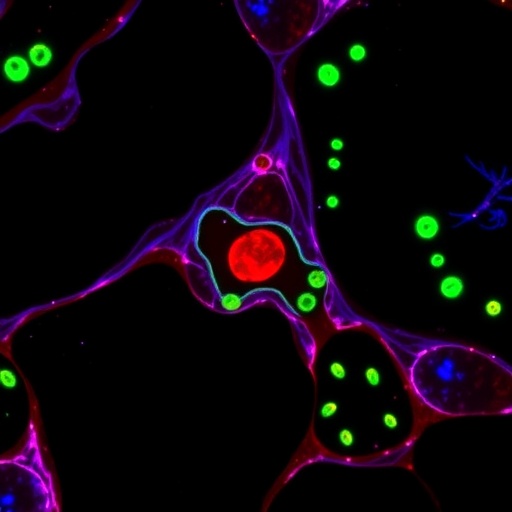
In the intricate realm of reproductive medicine, the quest for optimizing fertility treatments remains paramount, especially for women grappling with polycystic ovary syndrome (PCOS). Among the myriad approaches being investigated, a recent randomized controlled trial conducted by Alizadeh et al. has cast new light on the efficacy of Dexamethasone as an adjuvant therapy within the antagonist protocol of in vitro fertilization (IVF) and intracytoplasmic sperm injection (ICSI). This study represents a significant advance in our understanding of hormonal interventions in assisted reproductive technology (ART), particularly for women affected by hormonal dysfunctions such as PCOS.
PCOS stands as one of the leading causes of infertility in women, characterized by hormonal imbalances, irregular menstrual cycles, and metabolic complications. The pathophysiology of PCOS often renders conventional fertility treatments challenging and necessitates the exploration of adjunct therapies that could improve outcomes. In this context, the incorporation of Dexamethasone—a synthetic steroid with potent anti-inflammatory properties—raises intriguing possibilities for enhancing ovarian response and overall success rates in IVF/ICSI cycles.
The trial recruited a well-defined population of PCOS patients who were undergoing ART, providing a substantial sample size that underpins the reliability of the findings. This rigorous approach included a control group receiving the standard antagonist protocol without Dexamethasone, thereby allowing for a clear comparison between the efficacy of the two protocols. By implementing this controlled design, the investigators could eliminate potential confounding factors, ensuring that any observed differences in outcomes directly relate to the addition of Dexamethasone.
Dexamethasone is known to play a role in modulating the hypothalamic-pituitary-gonadal axis, which is often dysregulated in women with PCOS. The study hypothesized that Dexamethasone, through its glucocorticoid effects, might enhance oocyte quality and improve embryo development, thus increasing the likelihood of successful implantation and pregnancy. This potential mechanism of action is grounded in the drug’s ability to reduce adrenal hyperandrogenism, a common feature of PCOS that can adversely affect reproductive outcomes.
As the trial unfolded, key parameters such as ovarian response rates, oocyte yield, embryo quality, and clinical pregnancy rates were meticulously monitored and analyzed. The researchers employed robust statistical methods to quantify the impact of Dexamethasone on these critical endpoints, presenting their findings in a manner that is both comprehensive and accessible to a wide audience, from healthcare professionals to potential patients.
Initial results from the trial suggest that Dexamethasone indeed confers significant benefits when used as part of the antagonist protocol. Patients receiving Dexamethasone exhibited a marked improvement in their ovarian response compared to those who did not receive the adjuvant therapy. Furthermore, the quality of embryos produced during the IVF/ICSI cycles was notably enhanced in the treatment group, supporting the hypothesis that Dexamethasone can positively influence reproductive outcomes in women with PCOS.
The implications of these findings extend beyond the immediate results of the study. By establishing Dexamethasone as a viable adjuvant in ART protocols for PCOS patients, the research opens new avenues for tailoring fertility treatments to individual patient profiles. This personalized approach marks a departure from one-size-fits-all methodologies, instead fostering an environment where treatments can be optimized based on hormonal and metabolic characteristics.
Moreover, the societal impact of improved fertility treatments cannot be overstated. Infertility remains a deeply personal and often distressing issue for many couples. Enhancing the success rates of ART through innovative therapeutic strategies like Dexamethasone could alleviate some of the emotional and financial burdens associated with prolonged attempts at conception. In this sense, the research not only contributes to the scientific community but also resonates with the lived experiences of individuals facing the challenges of infertility.
In an era where medical advancements are rapidly reshaping the fertility landscape, the insights from Alizadeh et al. prompt a reconsideration of existing practices and guidelines surrounding the management of PCOS in reproductive settings. As the medical community continues to evaluate the long-term effects of Dexamethasone in this context, ongoing research will be vital in solidifying its role and optimizing protocols for diverse patient populations.
Furthermore, the trial illustrates the importance of collaborative research efforts that bridge laboratory findings with clinical practice. The interdisciplinary nature of such studies enhances the robustness of the conclusions drawn and reinforces the necessity for continuous exploration and validation of new therapeutic avenues. By fostering a collaborative dialogue among endocrinologists, reproductive specialists, and researchers, the potential to revolutionize treatment paradigms grows exponentially.
The potential emergence of Dexamethasone as a cornerstone of PCOS management in ART settings necessitates a broader conversation about the integration of endocrinological insights into reproductive health. The hormonal interdependencies intrinsic to conditions like PCOS highlight the need for a nuanced understanding of how various therapies can interact and influence reproductive outcomes. It is vital for future studies to maintain a focus on the safety and long-term implications of introducing such corticosteroids into treatment regimens.
This study’s findings and the ongoing dialogue it inspires have the potential to catalyze further research in related fields. The intersection of hormone therapy and reproductive medicine represents a rich landscape for exploration, with the possibility of developing new protocols and optimizing existing ones to address specific patient needs. As research continues to evolve, the potential for improved fertility outcomes for women with PCOS looms large on the horizon.
In conclusion, the work conducted by Alizadeh and colleagues stands as a testament to the dynamic nature of fertility research and its capacity to transform lives. By shedding light on the efficacy of Dexamethasone within an antagonist treatment protocol for PCOS patients, this randomized controlled trial contributes significantly to the existing literature and paves the way for future advancements in reproductive medicine. The hope is that ongoing investigations will further elucidate the mechanisms at play, leading to a more sophisticated understanding of how best to serve couples yearning for the joy of parenthood.
Subject of Research: Evaluating the efficacy of Dexamethasone as an adjuvant in the antagonist protocol for PCOS patients undergoing IVF/ICSI.
Article Title: Evaluating Dexamethasone as an Adjuvant in the Antagonist Protocol in PCOS Patients Undergoing IVF/ICSI: A Randomized Controlled Trial.
Article References: Alizadeh, F., Amirian, M., Khadem, N. et al. Evaluating Dexamethasone as an Adjuvant in the Antagonist Protocol in PCOS Patients Undergoing IVF/ICSI: A Randomized Controlled Trial. Reprod. Sci. (2025). https://doi.org/10.1007/s43032-025-01895-7
Image Credits: AI Generated
DOI:
Keywords: Dexamethasone, PCOS, IVF, ICSI, adjuvant therapy, reproductive medicine, fertility treatment, randomized controlled trial.
Tags: adjuvant therapy in IVF protocolsDexamethasone in IVF for PCOSenhancing ART outcomes with Dexamethasonefertility challenges in women with PCOShormonal dysfunctions and reproductive healthhormonal interventions in assisted reproductive technologyICSI success rates in PCOS patientsmetabolic complications of PCOSoptimizing fertility treatments for PCOSpolycystic ovary syndrome and infertilityrandomized controlled trial on Dexamethasonesynthetic steroids for ovarian response




